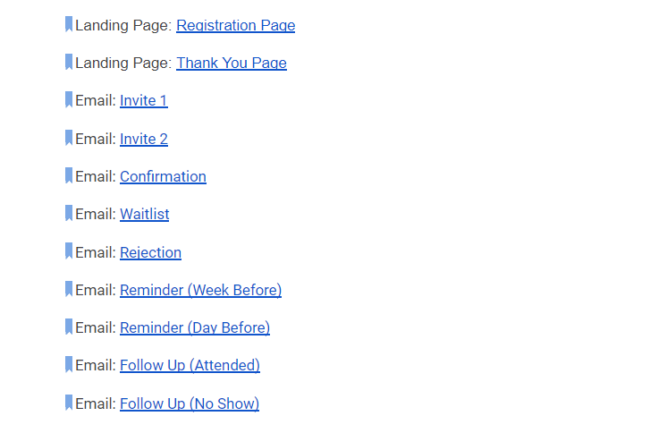Imagine this…
You’re in charge of a major event and those email invites that are scheduled to be sent out today aren’t going out anytime soon. You silently start freaking out because you had chosen this specific send date in order to give your invitees an entire month to RSVP, and the number of registrants is the biggest key result that your boss is using to measure your success.
How do you make sure this never happens again?
1. Create a master calendar of events that everyone has access to
You might have your own calendar, but sharing it with every department that’s involved in the process is vital. That way, your content department will know exactly when you need copy, your martech team will know exactly when you need a new email template, your social media team will know exactly when to promote event announcements, and your marketing automation team will know exactly when to build, QA, and send everything.
2. Create a list of every copy asset that’s needed
Our Content Services team does a lot of work with a Fortune 25 company’s events team, and we use the same copy template for every event. In it, we have every single asset that could possibly be needed—from invitations, to registration pages, to RSVP confirmations, to reminders, to follow-up thank you notes, and more.

Right at the beginning of a new project, the Field Marketing Manager makes a copy of the template and deletes any assets that aren’t needed for that specific event. That way, everyone who’s writing copy and building emails and landing pages knows exactly what deliverables are needed.
3. Plan ahead for emergencies
None of us ever likes to think about everything that could go wrong, but in the events world, something is bound to at some point. That’s why our Content Services team wrote some basic “Difficult Communications” copy that our client can use when things go awry.
Whether it’s an event that gets overbooked, an event that needs a date change, or an event where we need a nice way to turn away competitors, the basic brand-friendly messaging is already in place. That way, all we have to do is quickly add some details (like the new date for the event that’s being rescheduled, the name of the event that the competitors can’t come to, or a special discount code for people who were inconvenienced by the overbooking) and send out the email. It’s a major time-saver, and in certain situations, it can be a big brand-saver.
Now that you know what could go wrong, eliminating those dreaded missed deadlines is easy as 1-2-3!




